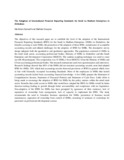Please use this identifier to cite or link to this item:
https://cris.library.msu.ac.zw//handle/11408/3384Full metadata record
| DC Field | Value | Language |
|---|---|---|
| dc.contributor.author | Mazhindu, Kenneth | - |
| dc.contributor.author | Mafuba, Grazyina | - |
| dc.date.accessioned | 2018-11-24T13:26:43Z | - |
| dc.date.available | 2018-11-24T13:26:43Z | - |
| dc.date.issued | 2013 | - |
| dc.identifier.issn | 2224-4441 | - |
| dc.identifier.issn | 2226-5139 | - |
| dc.identifier.uri | www.aessweb.com/pdf-files/ijass%203(11)-2315-2349.pdf | - |
| dc.identifier.uri | http://hdl.handle.net/11408/3384 | - |
| dc.description.abstract | The objectives of this research paper are to establish the level of the adoption of the International Financial Reporting Standards (IFRS) for the Small to Medium Enterprises(SMEs) in Zimbabwe, the benefits accruing to such SMEs, the promotion of the adoption of these IFRS, maintenance of acceptable accounting records and related challenges for the adoption of IFRS for SMEs. The descriptive survey design integrate both the quantitative and qualitative approaches. The population consisted of SMEs in the retail trade sector, accounting professional bodies, Ministry of SMEs in Zimbabwe and the Small Enterprise and Development Corporation (SEDCO). The random sampling technique was used to come up with 40 participants. The composition was 32 SMEs,1 from SEDCO,1 from the Ministry of SMEs and 6 from accounting professional bodies. The research instruments used were questionnaires and interviews. Research findings showed that 80% of the SMEs did not maintain accounting records; none had adopted IFRS for SMEs. 20% which had accounting records observed provisions of IFRS in general which were in line with Generally Accepted Accounting Standards. Most of the employees in SMEs that lacked accounting records lacked basic accounting financial knowledge. A few SMEs prepare the Statement of Comprehensive Income, Statement of Financial Position and Statement of Cash flows. Little effort is being made to encourage the adoption of IFRS for SMEs by the policy makers within the retail trade sector. Benefits that could accrue to SMEs that would have adopted the IFRS for SMEs would be better decision-making leading to growth through better accountability and compliance with tax legislation. Non-adoption of the IFRS for SMEs has been prompted by ignorance of their existence, lack of separation of ownership from management, lack of capacity to implement the IFRS. The study recommends the need to formalise business operations for SMEs, promotion of business record maintenance, separation of ownership from control of SMEs, mounting of seminars or workshops for personnel on professional development courses | en_US |
| dc.language.iso | en | en_US |
| dc.publisher | Asian Economic and Social Society | en_US |
| dc.relation.ispartofseries | International Journal of Asian Social Science;Vol. 3, No. 11; p. 2315-2349 | - |
| dc.subject | Small to medium enterprises | en_US |
| dc.subject | International financial reporting standards | en_US |
| dc.title | The adoption of international financial reporting standards for small to medium enterprises in Zimbabwe | en_US |
| dc.type | Article | en_US |
| item.cerifentitytype | Publications | - |
| item.grantfulltext | open | - |
| item.openairecristype | http://purl.org/coar/resource_type/c_18cf | - |
| item.languageiso639-1 | en | - |
| item.openairetype | Article | - |
| item.fulltext | With Fulltext | - |
| Appears in Collections: | Research Papers | |
Files in This Item:
| File | Description | Size | Format | |
|---|---|---|---|---|
| The Adoption of International Financial Reporting Standards for Small to Medium Enterprises in Zimbabwe.pdf | Abstract | 185.79 kB | Adobe PDF |  View/Open |
Page view(s)
172
checked on Apr 26, 2025
Download(s)
128
checked on Apr 26, 2025
Google ScholarTM
Check
Items in MSUIR are protected by copyright, with all rights reserved, unless otherwise indicated.



